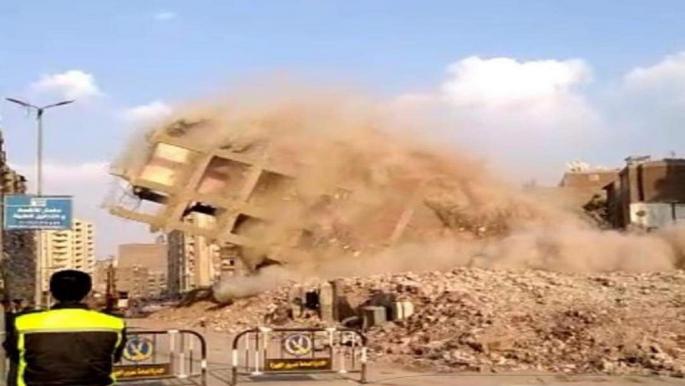The contradiction in the Egyptian regime and its double standards in the preservation and restoration of antiquities attracted the attention of observers who tried to explain this strange behaviour.
Israel in Arabic Facebook page via Twitter published photos of the visit of the Israeli ambassador to Cairo, Amira Oron, to the Jewish temple Eliyahu Hanabi in Alexandria, in the north of the country, after the completion of its restoration. The Israeli ambassador thanked Egyptian President Abdel Fattah al-Sisi for his initiative to restore the temple and considered it a blessed initiative to preserve Egyptian Jewish history’s riches. The increasing interest of the Egyptian government in Jewish antiquities in Egypt during the past years raises many controversies and questions, especially in light of the government’s neglect of the rest of the country’s antiquities.
Pharaonic antiquities are stolen and smuggled outside the country. Islamic monuments are being continuously demolished and many Coptic monuments have collapsed. Massive government spending on restoring Jewish antiquities in Egypt began since General al-Sisi seized power in 2013 after the military coup. The number of Israeli tourists coming to Egypt witnessed a remarkable rise.
Jewish antiquities
In August 2017, the Ministry of Antiquities announced the start of the restoration of the Eliyahu Hanabi temple, for EGP 100 million ($6.3 million). Then, in December 2018, the Minister of Antiquities sparked a storm of controversy after announcing before the Culture and Information Committee in the House of Representatives that the government had allocated EGP 1.3 billion ($82 million) to restore synagogues. Then he returned to explain to Muhammad Abdel Aziz, director of the antiquities of Historic Cairo, that the money is intended for the restoration of eight archaeological projects, including the Jewish temple in Alexandria.
In February 2019, the Israeli channel Makan broadcasted a video report that sparked controversy on social media after it was shown on the Israel in Arabic page. The video showed that the executive bodies cleaned and restored the Jewish cemeteries in Basateen in Cairo. The restoration of Jewish cemeteries in Basateen came after a promise from al-Sisi to a Jewish delegation that met him in Cairo. Two days later, the page published pictures, which it said were of two Jewish rabbis, who began and followed up the cleaning and restoration work.
Jewish Museum
The Egyptian Ministry of Antiquities confirmed that it would not hesitate to restore Jewish antiquities in Egypt, as they are Egyptian antiquities that must be protected according to the Antiquities Protection Law and they are part of Egyptian heritage.
Government attention prompted Magda Haroun, head of the Jewish community in Egypt, during press statements, to propose the idea of establishing an Egyptian museum that would collect Egyptian Jewish antiquities and collections. She explained that the goal is to record in Egyptian history that the Jews of Egypt were an integral part of the Egyptian societal fabric, she said. According to estimates, the Jewish community owns 13 temples in Cairo and about eight synagogues in Alexandria. Some of them are open to visitors, and the others are closed due to poor conditions. The Egyptian government has restored some of them.
The most prominent and famous Jewish synagogue in Cairo, the Adly Temple, which is located on Adly Street in Cairo’s centre, is one of the most luxurious synagogues in Cairo. However, it is one of the most modern buildings. In addition is the Ibn Ezra temple, which is located in the Old Cairo Fustat neighbourhood, which has been converted into a tourist attraction. The most famous temple in Alexandria is the Eliyahu Hanabi Temple on Prophet Daniel Street, followed by the Temple of De Mansi, built by Jacob de Manasseh, who headed the Jewish community in Cairo 1869.
Israeli tourism
According to the assurances of the former Israeli ambassador to Egypt, David Goffin, the number of Israeli tourists who visited Egypt during 2018 reached 850,000, compared to less than 400,000 in previous years. The percentage of Israeli tourism in Egypt is two per cent, most of which is concentrated in South Sinai cities, as they enter through the Eilat Port.
Meanwhile, Simon Ovadia, director of a tourism company in Israel, said that the number of Israelis visiting Egypt increased from 200 to 300 per cent during the current year 2020 compared to last year’s corresponding period. Meanwhile, the writings of many tourism officials in Israeli newspapers reveal that many Egyptians are refusing to deal with the Israelis during their visits to Egypt.
Why?
Observers say that the Egyptian regime is not restoring Jewish antiquities because it believes in the importance of antiquities, but rather it is furthering its own political objectives. The Egyptian regime seeks rapprochement with Israel, to obtain political and economic gain. In addition to that, it wants to paint a more tolerant picture.
Observers demonstrate this by the official deliberate neglect of the Pharaonic, Islamic, and Coptic monuments in Egypt. During the past years, Egyptian antiquities have suffered from increasing neglect, and smuggling has increased.





Recent Comments